|
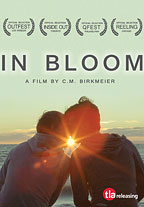
In Bloom
TLA
Releasing,
2013
Director/Screenplay:
Chris Michael Birkmeier
Starring;
Kyle Wigent,
Tanner Rittenhouse,
Adam Fane,
Jake Andrews,
Steve Casillas,
Emma Blyth
Unrated,
87 minutes |
The Spark That Fades
by
Michael D. Klemm
Posted online August, 2014
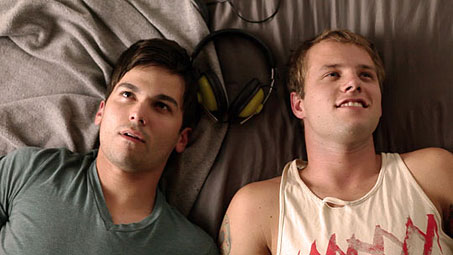
“Why is there always someone out there who could make me happier?” asks one of the protagonists in 2013’s In Bloom, the debut feature from writer/director Chris Michael Birkmeier. In Bloom is a thoughtful, and very realistic, story about the break-up of what appeared to be a warm and nourishing relationship. Instead of telling the usual story about two men meeting and falling in love, In Bloom explores the dynamics that destroyed the feelings they once had for each other. |
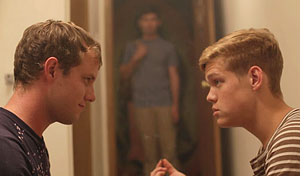 As the film opens, Kurt and Paul’s two year relationship is already over. They run into each other at a party and their strained attempts at conversation are awkward to say the least. As this framing story ends, a title announces that we have flashed back “Seven months earlier.” The setting is Chicago’s Boystown at the beginning of a hot summer. Kurt (Kyle Wigent) is a popular, young pot dealer. His boyfriend, Paul (Tanner Rittenhouse), works a dead-end job in a grocery store. They seem happy together – like best friends as well as lovers - though it should be noted that they each keep their own apartments. The cracks begin forming in their relationship when a new pot customer named Kevin (Adam Fane) starts flirting with Kurt. As the film opens, Kurt and Paul’s two year relationship is already over. They run into each other at a party and their strained attempts at conversation are awkward to say the least. As this framing story ends, a title announces that we have flashed back “Seven months earlier.” The setting is Chicago’s Boystown at the beginning of a hot summer. Kurt (Kyle Wigent) is a popular, young pot dealer. His boyfriend, Paul (Tanner Rittenhouse), works a dead-end job in a grocery store. They seem happy together – like best friends as well as lovers - though it should be noted that they each keep their own apartments. The cracks begin forming in their relationship when a new pot customer named Kevin (Adam Fane) starts flirting with Kurt.
|
|
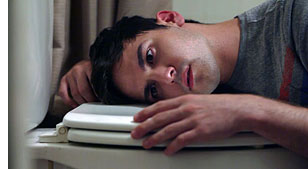 Initially, Kurt brushes off the young man’s advances but the kid is persistent. This awakens new feelings of restlessness. Kurt, who seems to be always stoned, begins fixating on the idea that his current relationship isn't “perfect.” But he isn’t the only one with the jitters. Paul is also bored and dreams of going to Paris. “Don’t you get tired,” Paul asks, “of the same thing over and over?” Kurt seems to be a man without ambition; content to sell marijuana and get stoned during his free time for the rest of his life. Ironically, it will be Paul’s suspicions, over an assignation between Kurt and Kevin that hasn’t even happened yet, that sets Kurt down the path towards their eventual break-up. Initially, Kurt brushes off the young man’s advances but the kid is persistent. This awakens new feelings of restlessness. Kurt, who seems to be always stoned, begins fixating on the idea that his current relationship isn't “perfect.” But he isn’t the only one with the jitters. Paul is also bored and dreams of going to Paris. “Don’t you get tired,” Paul asks, “of the same thing over and over?” Kurt seems to be a man without ambition; content to sell marijuana and get stoned during his free time for the rest of his life. Ironically, it will be Paul’s suspicions, over an assignation between Kurt and Kevin that hasn’t even happened yet, that sets Kurt down the path towards their eventual break-up.
|
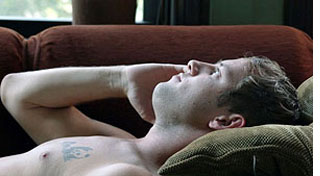 Kevin's sudden appearance is a catalyst for change but not in a good way. Kurt confesses to his roommate, Brad (Steve Casillas), that he has grown bored with Paul. His lament, regrettably, is one that is all too common as he describes the spark that fades. “Remember when a text message gave you butterflies?” he asks. “Remember how everything about them gave you a hard-on in the beginning?” This scene’s simple honesty was, for me, one of the standout moments of the film. Kevin's sudden appearance is a catalyst for change but not in a good way. Kurt confesses to his roommate, Brad (Steve Casillas), that he has grown bored with Paul. His lament, regrettably, is one that is all too common as he describes the spark that fades. “Remember when a text message gave you butterflies?” he asks. “Remember how everything about them gave you a hard-on in the beginning?” This scene’s simple honesty was, for me, one of the standout moments of the film.
|
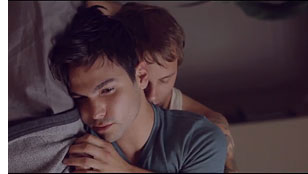 The basic story, to be frank, is a familiar one. What impressed me was how realistically it is told without relying on operatic histrionics. There is a quiet breakup scene on the stairs of Paul’s apartment building that is heartbreaking, especially when Paul asks, “What did I do?” Reflecting what often happens in real life, Kurt will come to regret how impulsively he ended their relationship but, by then, it will be too late. In Bloom gets a lot of things right. When it becomes clear to Paul that their life together is over, he does what most young people today would do: he deletes all the pictures of Kurt from his smartphone. The basic story, to be frank, is a familiar one. What impressed me was how realistically it is told without relying on operatic histrionics. There is a quiet breakup scene on the stairs of Paul’s apartment building that is heartbreaking, especially when Paul asks, “What did I do?” Reflecting what often happens in real life, Kurt will come to regret how impulsively he ended their relationship but, by then, it will be too late. In Bloom gets a lot of things right. When it becomes clear to Paul that their life together is over, he does what most young people today would do: he deletes all the pictures of Kurt from his smartphone.
|
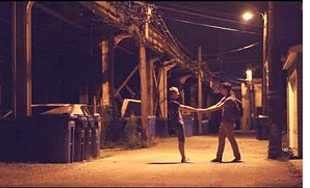 The press for In Bloom cites comparisons to Andrew Haigh’s acclaimed Weekend. While Birkmeier’s film might not quite hit the same high notes, this description is also an apt one. Both films are well written and photographed, and feature two attractive, but not gorgeous, young men in an unexceptional, yet still vivid, relationship. It’s also refreshing to older reviewers like me when the story is simply about two men who are gay without making the story about being gay. There is no coming out story, or any farcical family fracas. Breakups, like the one that these two men experience, are universal regardless of gender. The press for In Bloom cites comparisons to Andrew Haigh’s acclaimed Weekend. While Birkmeier’s film might not quite hit the same high notes, this description is also an apt one. Both films are well written and photographed, and feature two attractive, but not gorgeous, young men in an unexceptional, yet still vivid, relationship. It’s also refreshing to older reviewers like me when the story is simply about two men who are gay without making the story about being gay. There is no coming out story, or any farcical family fracas. Breakups, like the one that these two men experience, are universal regardless of gender.
|
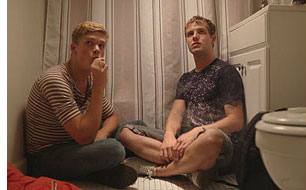 A subplot, involving a serial killer who is preying on young gay men, adds suspense even though we know from the framing story that Kurt and Paul are still alive and neither of them is going to get killed. Still, it adds to an aura of dread – especially when Kurt makes late night pot deliveries to his clients. In Bloom has many dramatic peaks, but it isn’t a humorless film. Paul turns into the poster child for paranoia whenever he smokes weed and tends to lock himself in bathrooms at parties (Kurt’s first meeting with Kevin is interrupted by Paul’s panicky text message from the john). Drama and comedy share equal time when he later walks in on Kurt and Kevin sharing a joint and giggling in the same bathroom. A subplot, involving a serial killer who is preying on young gay men, adds suspense even though we know from the framing story that Kurt and Paul are still alive and neither of them is going to get killed. Still, it adds to an aura of dread – especially when Kurt makes late night pot deliveries to his clients. In Bloom has many dramatic peaks, but it isn’t a humorless film. Paul turns into the poster child for paranoia whenever he smokes weed and tends to lock himself in bathrooms at parties (Kurt’s first meeting with Kevin is interrupted by Paul’s panicky text message from the john). Drama and comedy share equal time when he later walks in on Kurt and Kevin sharing a joint and giggling in the same bathroom.
|
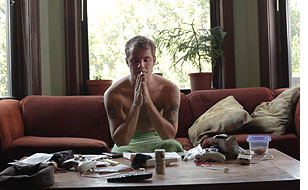 Comedic scenes, like the one on the beach where they point out which guys get them hot, come across as unforced and real (every gay couple does this). From bedroom horseplay to lovers’ quarrels, Kurt and Paul are believable as a longtime gay couple. The details of their crumbling relationship will undoubtedly seem familiar to many audience members, making it impossible to not feel sorry for our boys. The script is filled with little touches that add up to a satisfying whole. In Bloom is a very intimate film. The handheld camerawork gets in close and the effect is often visceral… even if you sometimes wish the camera was on a tripod so it would stop shaking. Most scenes play out in silence without distracting music and I always find this to be a good thing. (The film's running length isn't padded by long transitional montages set to banal pop songs while the characters drive, stare out the window, etc.) Comedic scenes, like the one on the beach where they point out which guys get them hot, come across as unforced and real (every gay couple does this). From bedroom horseplay to lovers’ quarrels, Kurt and Paul are believable as a longtime gay couple. The details of their crumbling relationship will undoubtedly seem familiar to many audience members, making it impossible to not feel sorry for our boys. The script is filled with little touches that add up to a satisfying whole. In Bloom is a very intimate film. The handheld camerawork gets in close and the effect is often visceral… even if you sometimes wish the camera was on a tripod so it would stop shaking. Most scenes play out in silence without distracting music and I always find this to be a good thing. (The film's running length isn't padded by long transitional montages set to banal pop songs while the characters drive, stare out the window, etc.)
|
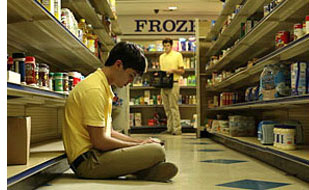 It helps that Wigend and Rittenhouse are exceptional as the two leads. The cast is terrific, right down to the supporting roles. Most memorable is Jake Andrews who plays Eddie, Paul’s creepy co-worker at the grocery store. Eddie is the annoying employee who seems to always appear whenever you’re violating company policy. His pathetic desire to be Paul’s friend is funny but also tugs on the heartstrings when he admits how jealous he felt upon seeing how “perfect” Paul and his boyfriend looked in the pictures on his Facebook page. It helps that Wigend and Rittenhouse are exceptional as the two leads. The cast is terrific, right down to the supporting roles. Most memorable is Jake Andrews who plays Eddie, Paul’s creepy co-worker at the grocery store. Eddie is the annoying employee who seems to always appear whenever you’re violating company policy. His pathetic desire to be Paul’s friend is funny but also tugs on the heartstrings when he admits how jealous he felt upon seeing how “perfect” Paul and his boyfriend looked in the pictures on his Facebook page.
|
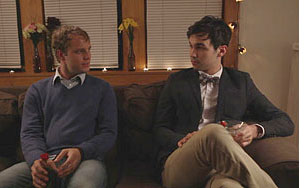 The director writes on the film’s website that much of In Bloom was inspired by the breakup of his own first serious relationship. It shows. A gifted writer can fabricate a story but it is a given that most tales come across as being more real when they are derived from personal experience. People fall in lust, and then in love, and then things stagnate as life gets in the way. Birkmeier's film hits all the right notes. He spins his tragic tale without a lot of unnecessary baggage, and sometimes simplicity is the best way to go. The director writes on the film’s website that much of In Bloom was inspired by the breakup of his own first serious relationship. It shows. A gifted writer can fabricate a story but it is a given that most tales come across as being more real when they are derived from personal experience. People fall in lust, and then in love, and then things stagnate as life gets in the way. Birkmeier's film hits all the right notes. He spins his tragic tale without a lot of unnecessary baggage, and sometimes simplicity is the best way to go.
|

